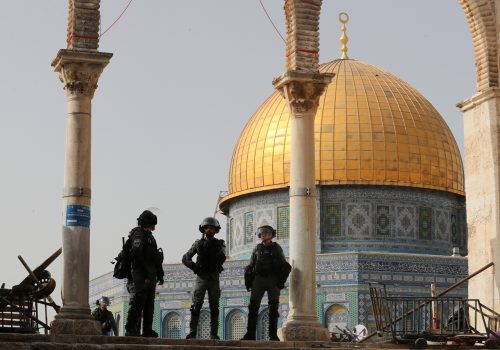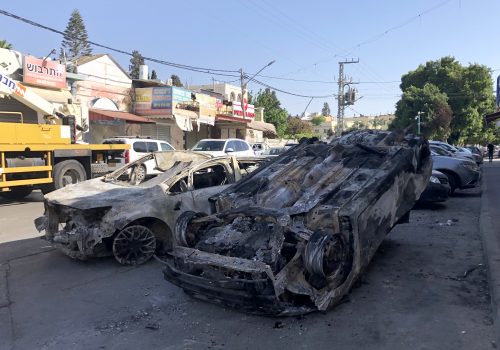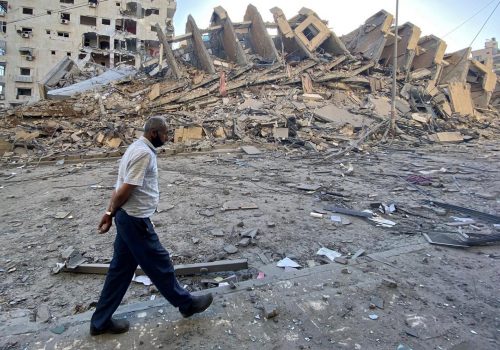FAST THINKING: An Israel-Hamas ceasefire in a changed world
JUST IN
The skies are quiet, for now. Under escalating international pressure after eleven days of bombings and rocket attacks, Israel and Hamas have announced a ceasefire beginning today, brokered by Egypt. In addition to those killed—reportedly at least 219 people in Gaza, twenty-five in the West Bank, and twelve in Israel—the conflict leaves extensive physical and psychological damage on both sides. Will this fragile peace hold? What are the enduring consequences of the conflict for the region and the world? We checked back in with the experts who broke down the conflict for you last week (check out our deep-dive expert analysis for more on what’s coming next after the ceasefire).
TODAY’S EXPERT REACTION COURTESY OF
- Tuqa Nusairat (@TuqaNusairat): Deputy director of the Rafik Hariri Center & Middle East programs
- Shalom Lipner (@shalomlipner): Jerusalem-based nonresident senior fellow in the Middle East programs and former advisor to seven Israeli prime ministers
- Jonathan Ferziger (@jhferziger): Jerusalem-based nonresident senior fellow in the Middle East programs and veteran foreign correspondent
Changing global perceptions
- In some ways, the conflict changed little. The “facts on the ground that Palestinians are protesting, from occupied East Jerusalem to Gaza to Lod, are not going away,” Tuqa says.
- As Shalom notes, Israel and Hamas “won’t even talk to each other directly,” meaning they likely “will return to the battlefield in due course.”
- But what has changed is the way the broader world reacts to these clashes, as we saw play out vividly over the past two weeks. Jonathan argues that with its “heavy-handed police actions in putting down rioters” at the Al-Aqsa mosque in Jerusalem and in cities across the country, and in “blowing up high-rise buildings and killing Hamas operatives,” Israel may have compelled Gaza’s rulers to seek a ceasefire, but the moves “galvanized popular anger against the Jewish state internationally.”
- Tuqa tells us that in “broadcasting in real time the impact of the Israeli occupation” and organizing their own protests, Palestinian social-media campaigns proved effective, with a general strike this week representing “the first time in over four decades when both Palestinian citizens of Israel and Palestinians in the occupied territories engaged in a united display of civil disobedience.”
- Her takeaway? “This is a key turning point for Palestinians being able to tell their own story to the world.”
Shifting US currents
- Shalom points out that the Biden administration “offered steadfast and principled support of Israel’s right to self-defense, resisting calls from other nations to censure the Netanyahu government.”
- But as Tuqa notes, support for Israel in Congress is not as surefire as it once was. As lawmakers on the progressive left voiced criticism of Israel, some of their critiques were echoed by a group of Jewish Democratic members of Congress and pro-Israel Senator Bob Menendez (D-NJ).
- “The events of the past month will not change US support for Israel overnight,” Tuqa says. “But holding Israel accountable for its use of US military funding is not as distant a principle as it has been the past several decades.”
- The clashes may also signal a diminution of the Abraham Accords, Israel’s normalization agreements with the United Arab Emirates and other Arab countries. Jonathan says the Biden administration considers these deals “born in sin,” as they were negotiated under former US President Donald Trump and “leavened with insults to the Ramallah-based Palestinian Authority.”
- What happens now? While “Israeli tourists will return to Dubai’s glitzy hotels and Emirati investors will look for more Tel Aviv technology start-ups to finance,” the accords must “be adapted to the priorities and style of a new Democratic president to get any lift from Washington,” he says.
Israel’s to-do list
- Given those political shifts, Shalom advises Israel to improve its “coordination” with US President Joe Biden. “Maintaining harmonious relations with the Biden administration will be imperative for Israel as negotiations progress over a renewed nuclear deal with Iran,” he says.
- Other needed steps include plugging any gaps in Israel’s vaunted Iron Dome missile-defense system, which was 90 percent effective during the recent conflict. And Shalom says Israel must do better in the public-relations battle, as the government’s communicators “struggled to provide context for the damning images coming out of Gaza.”
- But what the country most needs for international credibility, Shalom adds, is political certainty. A fifth election in two years, aimed at breaking the country’s political logjam, is looming. And Prime Minister Benjamin Netanyahu’s foes are now unlikely to form a governing coalition in Israel’s legislature.
- “Instead of holding him to account—as the country’s leader of more than a decade—for the circumstances which precipitated the fighting,” Shalom says, “Israelis have actually become less willing now to change prime ministers (at such a precarious time) and more inclined to lean on Netanyahu’s years of experience and reputation for being a security maven.”
Further reading
Thu, May 20, 2021
Experts React: What’s next after the Israel-Hamas ceasefire?
MENASource By
After eleven days of cross-border fighting, Hamas and Israel have agreed to a ceasefire. Atlantic Council experts react to the news, assess the significance of the recent surge in violence, and offer their thoughts on how the international community should deal with the conflict moving forward.
Thu, May 13, 2021
The escalation between Israel and Hamas: What’s new—and what’s not
MENASource By Shalom Lipner
While the intensity of the fighting appears to have caught some veteran practitioners of Middle East conflict and diplomacy by surprise, a trail of discernable factors led to this fraught outcome.
Wed, May 12, 2021
FAST THINKING: How bad will Israeli-Palestinian violence get?
Fast Thinking By
Is an all-out war brewing? What does this mean for Prime Minister Benjamin Netanyahu’s future? What role will regional and global powers now play in the confrontation? From Washington to Jerusalem, our experts are here to weigh in.
Image: Palestinians shake hands after returning to their destroyed houses following Israel- Hamas truce, in Beit Hanoun in the northern Gaza Strip, on May 21, 2021. Photo by Mohammed Salem/Reuters.


